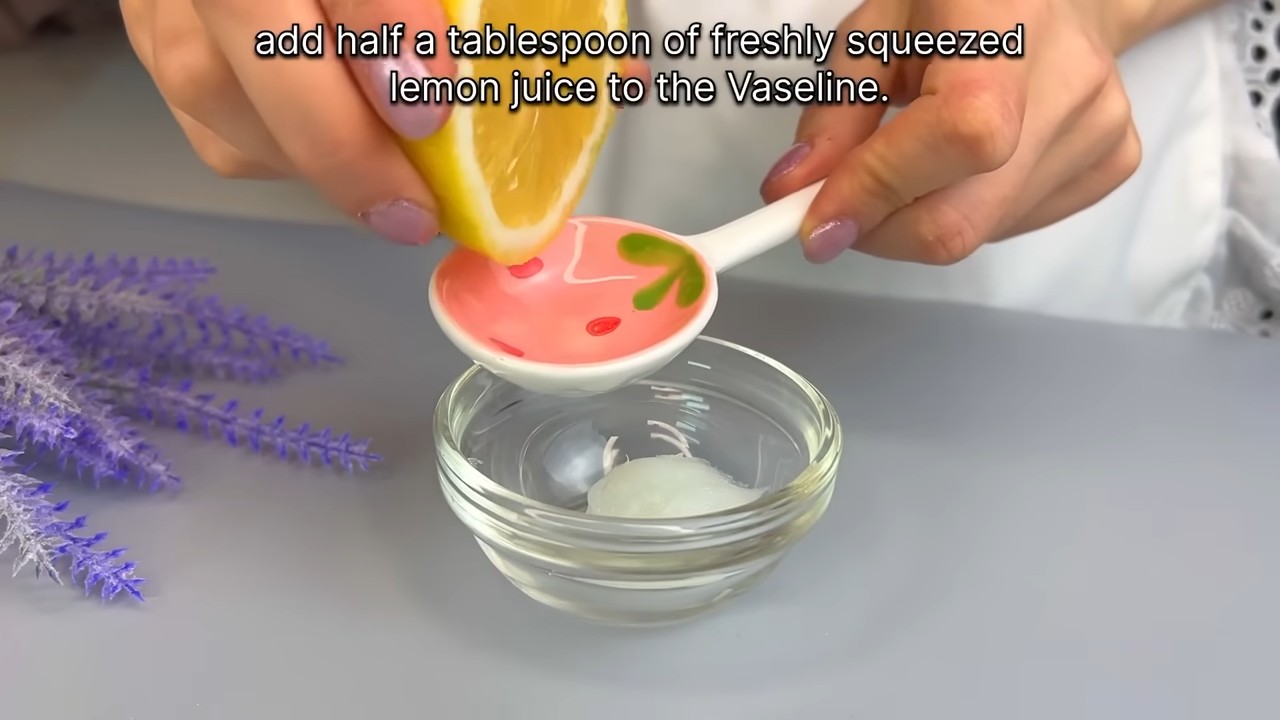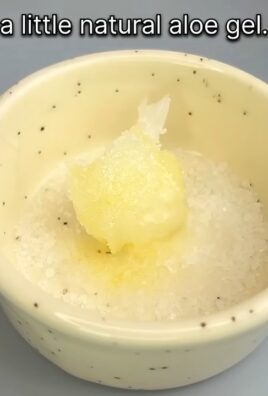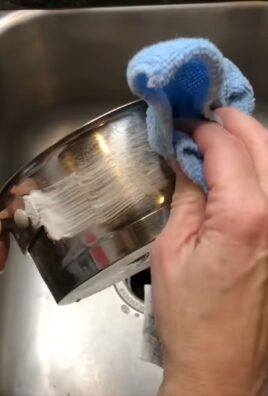Lemon juice hacks are about to become your new best friend in the garden! Forget spending a fortune on fancy fertilizers and harsh chemicals. I’m here to show you how this humble citrus fruit can unlock a world of possibilities for your plants, and your wallet will thank you for it.
Lemons have been cultivated for centuries, with roots tracing back to Southeast Asia. Beyond their culinary uses, their potent juice has been valued for its medicinal and cleaning properties. Now, we’re bringing that power to the garden! Think of it as a natural, time-tested secret weapon passed down through generations of resourceful gardeners.
Are your hydrangeas not as vibrant as you’d like? Struggling with stubborn weeds that just won’t quit? Or maybe you’re battling fungal diseases that threaten your precious tomatoes? These are common gardening woes, and I’ve got good news: lemon juice hacks can help! This article is packed with simple, effective, and eco-friendly solutions to tackle these problems and more. I’ll guide you through easy-to-follow DIY projects that will transform your garden into a thriving oasis, all thanks to the power of lemons. So, grab a few lemons, and let’s get started!

Unlocking the Power of Lemons: DIY Hacks You Need to Know
Hey there, fellow DIY enthusiasts! I’m so excited to share some amazing lemon hacks with you. Lemons are seriously a powerhouse of natural goodness, and beyond just making delicious lemonade, they can be used for so much around the house. Get ready to be amazed by these simple, effective, and budget-friendly tricks!
Cleaning Powerhouse: Lemon’s Natural Cleaning Abilities
Lemons are naturally acidic, which makes them fantastic for cutting through grease, grime, and even disinfecting surfaces. Plus, they leave behind a fresh, clean scent that’s way better than harsh chemicals.
Cleaning Your Microwave with Lemon Steam
This is one of my absolute favorite hacks because it’s so easy and effective. Say goodbye to splattered food and lingering odors!
1. Prepare Your Lemon Solution: Cut a lemon in half. Squeeze the juice from both halves into a microwave-safe bowl. Add about a cup of water to the bowl. You can even toss the squeezed lemon halves into the water for extra cleaning power.
2. Microwave the Mixture: Place the bowl in your microwave and heat it on high for 3-5 minutes, or until the water boils and the microwave is filled with steam.
3. Let it Sit: Don’t open the microwave immediately! Let the steam work its magic for another 5-10 minutes. This will loosen all the grime and food particles.
4. Wipe it Clean: Carefully remove the bowl (it will be hot!). Use a clean cloth or sponge to wipe down the inside of the microwave. You’ll be amazed at how easily the dirt comes off.
5. Dry and Enjoy: Dry the inside of the microwave with a clean cloth. Your microwave will be sparkling clean and smell lemony fresh!
Shining Stainless Steel with Lemon
Stainless steel can be a pain to keep clean, but lemon juice makes it a breeze.
1. Prepare Your Lemon: Cut a lemon in half.
2. Rub and Scrub: Rub the cut side of the lemon directly onto the stainless steel surface, focusing on areas with water spots, fingerprints, or grime.
3. Let it Sit (Optional): For tougher stains, let the lemon juice sit on the surface for a few minutes.
4. Rinse and Dry: Rinse the surface with water and dry it thoroughly with a clean cloth. The lemon juice will cut through the grime and leave your stainless steel shining.
Freshening Your Cutting Board
Cutting boards, especially wooden ones, can absorb odors and harbor bacteria. Lemon juice is a natural disinfectant and deodorizer.
1. Prepare Your Lemon: Cut a lemon in half.
2. Rub the Cutting Board: Rub the cut side of the lemon all over the surface of your cutting board.
3. Let it Sit: Let the lemon juice sit on the cutting board for about 10-15 minutes.
4. Rinse and Dry: Rinse the cutting board thoroughly with warm water and dry it completely. Your cutting board will be clean, fresh, and ready to use.
Beauty Boost: Lemon’s Natural Beauty Benefits
Lemons aren’t just for cleaning; they can also work wonders for your skin and hair! Always remember to do a patch test before applying lemon juice to your skin, as it can be irritating for some people. And never go out in the sun with lemon juice on your skin, as it can make you more susceptible to sunburn.
Brightening Skin with Lemon Juice
Lemon juice can help lighten dark spots and even out skin tone.
1. Dilute the Lemon Juice: Mix equal parts lemon juice and water. This is crucial to avoid irritation.
2. Apply to Dark Spots: Using a cotton ball, apply the diluted lemon juice directly to dark spots or areas of uneven skin tone.
3. Let it Sit: Leave the lemon juice on your skin for 10-15 minutes.
4. Rinse Thoroughly: Rinse your skin thoroughly with cool water.
5. Moisturize: Apply a moisturizer to your skin to prevent dryness.
6. Repeat Sparingly: Use this treatment only 1-2 times per week, as overuse can dry out your skin.
Natural Hair Lightener
Want to add some natural highlights to your hair? Lemon juice can do the trick!
1. Prepare Your Lemon Juice: Squeeze the juice from several lemons into a bowl. The amount you need will depend on the length and thickness of your hair.
2. Dilute (Optional): If you have dry or sensitive hair, you can dilute the lemon juice with water.
3. Apply to Hair: Apply the lemon juice to the sections of your hair you want to lighten. You can use a spray bottle or simply apply it with your hands.
4. Soak Up the Sun: Go outside and let your hair soak up the sun for 30-60 minutes. The sun’s rays will activate the lemon juice and help lighten your hair.
5. Rinse and Condition: Rinse your hair thoroughly with water and apply a deep conditioner to prevent dryness.
6. Repeat as Needed: You may need to repeat this process several times to achieve your desired level of lightness.
Strengthening Nails with Lemon Juice
Lemon juice can help strengthen brittle nails and remove stains.
1. Prepare Your Lemon Juice: Squeeze the juice from half a lemon into a small bowl.
2. Soak Your Nails: Soak your nails in the lemon juice for 5-10 minutes.
3. Rinse and Moisturize: Rinse your hands with water and apply a moisturizer to your nails and cuticles.
4. Repeat Regularly: Repeat this treatment several times a week for best results.
Household Helpers: Lemon’s Versatile Uses Around the Home
Lemons can do so much more than just clean and beautify. They’re also great for solving everyday household problems.
Deodorizing Your Garbage Disposal
A smelly garbage disposal is no fun. Lemon peels can help freshen it up.
1. Collect Lemon Peels: Save your lemon peels after using the juice for other purposes.
2. Grind the Peels: Run the garbage disposal with cold water and drop the lemon peels into the disposal.
3. Enjoy the Fresh Scent: The lemon peels will help clean the disposal and leave behind a fresh, citrusy scent.
Keeping Pests Away
Ants and other pests are often repelled by the scent of lemon.
1. Identify Entry Points: Find where ants or other pests are entering your home.
2. Apply Lemon Juice: Squeeze lemon juice around the entry points, such as cracks in the walls or windowsills.
3. Repeat as Needed: Repeat this process regularly to keep pests away.
Making a Natural Air Freshener
Skip the chemical-laden air fresheners and make your own natural version with lemons.
1. Gather Your Ingredients: You’ll need a lemon, water, and a saucepan. You can also add other ingredients like cinnamon sticks, cloves, or rosemary for a more complex scent.
2. Simmer the Mixture: Slice the lemon and place it in a saucepan with water and any other desired ingredients.
3. Simmer on Low: Simmer the mixture on low heat for several hours, adding more water as needed.
4. Enjoy the Aroma: The simmering mixture will release a fresh, natural scent that will fill your home.
Preventing Guacamole from Browning
Guacamole turns brown quickly due to oxidation. Lemon juice can help prevent this.
1. Add Lemon Juice: Squeeze a generous amount of lemon juice into your guacamole and mix well.
2. Store Properly: Store the guacamole in an airtight container in the refrigerator. The lemon juice will help keep it fresh and green for longer.
Bonus Tip: Making Lemonade Concentrate
Okay, I couldn’t resist adding one more! This is a great way to have fresh lemonade on hand whenever you want it.
1. Gather Your Lemons: You’ll need a lot of lemons for this!
2. Juice the Lemons: Juice all the lemons and strain the juice to remove any seeds or pulp.
3. Add Sugar: For every cup of lemon juice, add one cup of sugar.
4. Heat and Stir: Heat the lemon juice and sugar mixture in a saucepan over medium heat, stirring constantly until the sugar is completely dissolved.
5. Cool and Store: Let the mixture cool completely and then store it in an airtight container in the refrigerator.
6. Make Lemonade: To make lemonade, simply mix the concentrate with water to your desired strength.
I hope you enjoyed these lemon hacks as much as I do! They’re a simple, natural, and effective way to clean

Conclusion
So, there you have it! Mastering these lemon juice hacks is more than just a clever kitchen trick; it’s about unlocking the full potential of this vibrant citrus fruit and elevating your culinary creations. From boosting flavors in your favorite dishes to tackling everyday cleaning tasks with a natural, eco-friendly solution, the versatility of lemon juice is truly remarkable.
Why is this a must-try? Because it simplifies your life, saves you money, and adds a burst of freshness to everything you do. Imagine effortlessly removing stubborn stains, creating zesty marinades that tantalize the taste buds, or whipping up a refreshing homemade lemonade on a hot summer day – all thanks to the power of lemon juice. It’s a game-changer in the kitchen and beyond.
But the fun doesn’t stop there! Feel free to experiment with variations to suit your specific needs and preferences. For instance, if you’re using lemon juice as a cleaning agent, try adding a few drops of essential oils like lavender or tea tree for an extra boost of fragrance and antibacterial properties. When using it in cooking, consider pairing it with different herbs and spices to create unique flavor profiles. A squeeze of lemon juice over grilled fish with a sprinkle of dill is a classic combination, while a lemon-garlic marinade can transform ordinary chicken into a culinary masterpiece. You can even freeze lemon juice in ice cube trays for easy portioning and long-term storage. This is especially useful if you only need a small amount for a recipe and don’t want the rest of the lemon to go to waste.
Don’t be afraid to get creative and explore the endless possibilities that lemon juice offers. The key is to start with a good quality lemon, preferably organic, and to always use fresh juice for the best flavor and results. Bottled lemon juice can be a convenient alternative in a pinch, but it often lacks the vibrant taste and aroma of freshly squeezed juice.
We wholeheartedly encourage you to try these lemon juice hacks and discover the magic for yourself. Whether you’re a seasoned chef or a beginner in the kitchen, these tips will undoubtedly enhance your culinary skills and make your life a little bit easier.
And now, the most important part: we want to hear from you! Share your experiences, your successes, and even your failures with us. What are your favorite ways to use lemon juice? Do you have any unique hacks of your own to share? Let us know in the comments below! Your feedback is invaluable, and it helps us create even better content for you in the future. So, go ahead, grab a lemon, and start experimenting. You might just be surprised at what you discover! Embrace the power of lemon juice and unlock a world of flavor and possibilities.
Frequently Asked Questions (FAQs)
1. How long does fresh lemon juice last?
Freshly squeezed lemon juice is best used immediately for optimal flavor and nutritional value. However, if you need to store it, you can keep it in an airtight container in the refrigerator for up to 2-3 days. After that, the flavor may start to diminish. For longer storage, consider freezing the juice in ice cube trays. Once frozen, transfer the cubes to a freezer bag for up to 3 months. Remember to label the bag with the date to keep track of freshness.
2. Can I use bottled lemon juice instead of fresh?
While fresh lemon juice is always preferred for its superior flavor and aroma, bottled lemon juice can be a convenient substitute in a pinch. However, be aware that bottled lemon juice often contains preservatives and may not have the same vibrant taste as fresh juice. If using bottled juice, look for brands that are 100% lemon juice and avoid those with added sugars or artificial flavors. In general, use about half the amount of bottled juice as you would fresh juice, as it can be more concentrated.
3. What are the best ways to extract the most juice from a lemon?
There are several techniques you can use to maximize the amount of juice you get from a lemon. First, roll the lemon firmly on a countertop before cutting it in half. This helps to break down the membranes inside the lemon, making it easier to juice. You can also microwave the lemon for about 15-20 seconds before juicing. This will soften the lemon and release more juice. Use a citrus juicer or reamer to extract the juice, pressing firmly and twisting the lemon half to get every last drop. For even more juice, you can use a fork to pierce the lemon flesh before juicing.
4. Are there any safety precautions I should take when using lemon juice for cleaning?
Lemon juice is a natural and effective cleaning agent, but it’s important to take certain precautions to avoid damaging surfaces. Always test lemon juice on an inconspicuous area first to ensure it doesn’t discolor or damage the material. Avoid using lemon juice on delicate surfaces like marble, granite, or wood, as it can etch or stain them. When cleaning with lemon juice, wear gloves to protect your skin from irritation. And never mix lemon juice with bleach, as this can create harmful fumes.
5. Can lemon juice help with skin problems?
Lemon juice contains citric acid, which has exfoliating and brightening properties that can help with certain skin problems. However, it’s important to use lemon juice with caution on your skin, as it can be irritating and cause sun sensitivity. Always dilute lemon juice with water before applying it to your skin, and avoid using it on sensitive areas like the eyes or mouth. Apply a small amount to a test area first to check for any adverse reactions. If you experience any redness, itching, or burning, discontinue use immediately. It’s also crucial to wear sunscreen after applying lemon juice to your skin, as it can make your skin more susceptible to sunburn. While some people find lemon juice helpful for lightening dark spots or acne scars, it’s important to consult with a dermatologist before using it for any skin conditions.
6. What are some creative ways to use lemon juice in cocktails and beverages?
Lemon juice is a staple ingredient in many classic cocktails and beverages, adding a refreshing and tangy flavor. In addition to the traditional lemonade, you can use lemon juice to create a variety of other drinks. Try adding a splash of lemon juice to iced tea for a zesty twist, or use it as a key ingredient in cocktails like margaritas, daiquiris, and whiskey sours. You can also make a refreshing lemon-infused water by adding lemon slices and a few sprigs of mint to a pitcher of water. For a more adventurous option, try making a homemade limoncello, an Italian lemon liqueur that’s perfect for sipping after dinner. The possibilities are endless!
7. How can I use lemon juice to prevent browning in fruits and vegetables?
Lemon juice is a natural antioxidant that can help prevent browning in fruits and vegetables. When cut fruits and vegetables are exposed to air, they undergo a process called oxidation, which causes them to turn brown. The citric acid in lemon juice inhibits this process, keeping your fruits and vegetables looking fresh and appealing. To prevent browning, simply toss the cut fruits or vegetables with a small amount of lemon juice. This works particularly well for apples, avocados, bananas, and potatoes. You can also add lemon juice to guacamole to keep it from turning brown.
8. Is there a difference between Meyer lemons and regular lemons when it comes to juicing?
Yes, there is a noticeable difference between Meyer lemons and regular lemons, particularly when it comes to juicing. Meyer lemons are a hybrid of lemons and mandarin oranges, resulting in a sweeter, less acidic flavor. They also have a thinner skin and produce more juice than regular lemons. When using Meyer lemons for juicing, you may need to adjust the amount of sugar or other sweeteners in your recipe, as they are naturally sweeter. Their milder acidity also makes them a great choice for people who find regular lemons too tart.
9. Can lemon juice be used to tenderize meat?
Yes, lemon juice can be used as a natural meat tenderizer. The citric acid in lemon juice helps to break down the protein fibers in meat, making it more tender and easier to chew. To use lemon juice as a tenderizer, simply marinate the meat in a mixture of lemon juice, olive oil, herbs, and spices for at least 30 minutes before cooking. Be careful not to marinate the meat for too long, as the acid can make it mushy. Lemon juice is particularly effective for tenderizing tougher cuts of meat like flank steak or skirt steak.
10. What are the environmental benefits of using lemon juice as a cleaning agent?
Using lemon juice as a cleaning agent offers several environmental benefits compared to conventional cleaning products. Lemon juice is a natural, biodegradable substance that doesn’t contain harsh chemicals or synthetic fragrances. This means it’s less likely to pollute waterways or harm aquatic life. It’s also a renewable resource, as lemons are grown on trees. By using lemon juice for cleaning, you can reduce your reliance on chemical-laden products that contribute to air and water pollution. Additionally, lemon juice is often packaged in recyclable containers, further reducing its environmental impact.




Leave a Comment